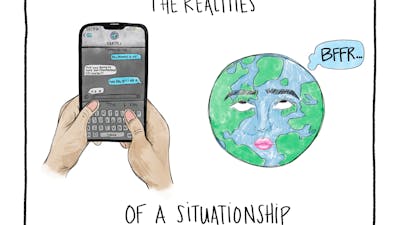COLUMN: Hey Midwesterners, climate change is something to worry about
According to a recent Gallup survey, only 62 percent of Americans are concerned about climate change.
I find this both troubling and frustrating. That number should be much higher.
Then, I wonder how much of that 62 percent lives in the Midwest? As a Midwesterner, I’m terrified for our future. I don’t understand why others aren’t.
We may not have to worry about rising sea levels quite as much as those who live on the coasts, but there are so many other factors that we should be concerned with.
Do people not recognize that our weather extremes have gotten worse with each season?
Hello, Midwest, but do you not feel how cold our winters have gotten or how hot and dry our past few summers have been?
Sometimes, I think people fail to understand what weather is compared to climate change. Weather refers to short-term atmospheric conditions. People think that because our last winter was rough, global temperatures can't be rising. That's weather, not climate changing.
According to NASA, these changes in climate include glaciers melting, sea levels rising, more frequent occurrences of extreme weather conditions and shifts in plant blooming times.
The Midwest National Climate Assessment reveals that since 1900 temperatures in the Midwest have risen 1.8 degrees Fahrenheit.
That may not seem like a big difference, but a lot of that is humans fault. We have been releasing millions of pounds of greenhouse gases into the air, allowing heat to be trapped in our atmosphere.
It's undeniable that Earth goes through its own heating and cooling processes. We would only need to look back to the Ice Age to understand that. However, when temperatures are rising 2 degrees in only 100 years, we need to recognize that this time it's our fault.
We caused this. We need to prepare for what is to come.
According to the Midwest National Climate Assessment, agricultural yields for both corn and soy beans could decrease in the long run.
Carbon dioxide levels are increasing in the air, which will most likely increase plant yields for a short period of time. However, other factors are predicted to overpower the high carbon dioxide levels, which will ultimately result in a decrease in production.
One major factor is drastic temperature fluctuations. Freezes in the spring during budding time and extreme heat waves in the summer causing draughts could both negatively impact crop production.
Higher temperatures will also put plants at a greater risk for disease.
When the Midwest produces $86 billion in agricultural exports, we need to be worried about how this loss in agricultural production will hurt our economy.
We also need to be concerned about our Great Lakes.
The Great Lakes makes up 84 percent of America's freshwater. With rising temperatures, our lakes may be in trouble.
According to a study from University of Michigan and Michigan State University, the increase in temperature of the lakes could result in more harmful algal blooms, which would negatively impact the water quality and the rest of the wildlife in the lakes.
Specifically, this could harm the fish and, in turn, the fishing industry.
There has also been less ice coverage on the Great Lakes in recent years, which allows for longer shipping seasons. This may seem like it would help our economy, but it also puts our lakes at a greater risk for more invasive species.
Invasive species like zebra mussels have been detrimental to the Great Lakes in the past, so putting our lakes at risk for more of these species will only hurt us down the line.
All of our decisions in the past are beginning to catch up with us. We can't change anything now. We can't take back all the greenhouse gases we have already put up in our atmosphere.
Yes, we can take steps like converting to renewable energy or recycling, but this will only prolong what is bound to happen.
Truthfully, we just need to be aware of what is to come, so we can begin to adapt.
Most importantly, we need to stop denying that this is happening.








